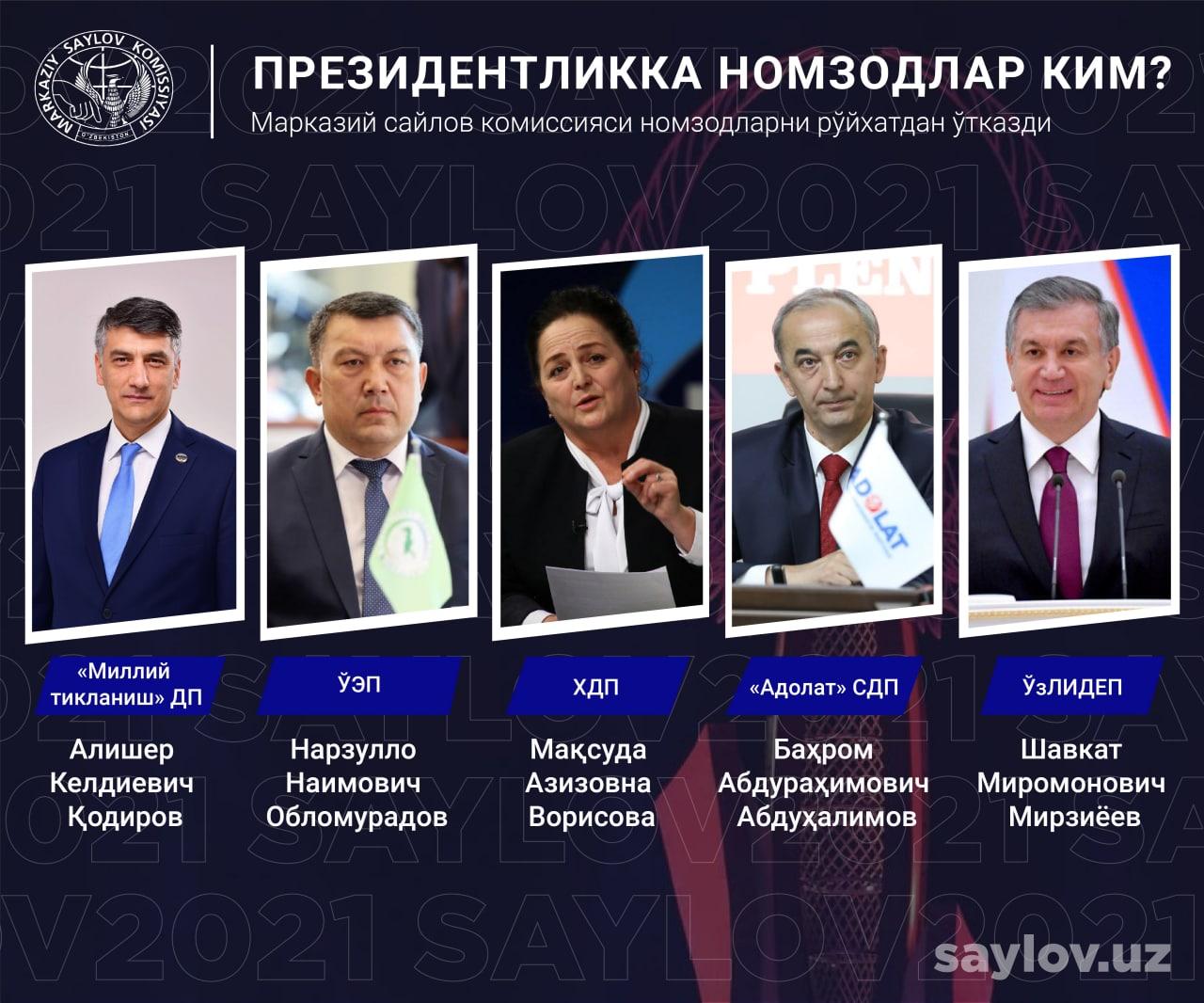- CEC
- Legislation
- Election commissions
- Elections and referendums
- International cooperation
- Press service

On October 24, 2021, an important political event took place in the life of our country - the presidential elections of the Republic of Uzbekistan. Candidates nominated by 5 political parties for the position of President of the Republic of Uzbekistan received the following number of votes:
- Bahrom Abdugʻhalimov from the Social Democratic Party "Adolat" received 3.39% of the votes;
- Narzullo Oblomuradov from the Ecological Party of Uzbekistan received 4.14% of the votes;
- Alisher Kodirov from the Democratic Party "Milli Tiklanish" received 5.48% of the votes;
- Maxuda Varisova from the People's Democratic Party of Uzbekistan received 6.63% of the votes;
- Shavkat Mirziyoyev from the Liberal Democratic Party of Uzbekistan, nominated by the "Tadbirkorlar va ishlab chiqaruvchilar" movement, received 80.12% of the votes.
According to the Law of the Republic of Uzbekistan, a candidate who receives more than 50% of the votes from the number of participating voters becomes the President. Shavkat Mirziyoyev was elected President of Uzbekistan with 80.12% of the votes, confirming his convincing victory and the trust of the voters.
The elections were characterized by high voter turnout, reflecting significant public interest in the political process.
80.4% of eligible voters participated in the elections. For the convenience of voting for all citizens of Uzbekistan residing abroad, 54 polling stations were set up in 37 countries.
More than 80.4% of over 20 million registered voters participated in the elections.
Elections for the President held in 2019 were conducted based on the adopted Electoral Code. Amendments and additions to the electoral legislation from February 8 to May 31 of the same year significantly expanded the rights and guarantees of participants in the electoral process, including voters, political parties, electoral commissions, public information media, and observers. The management system of electoral processes was improved using modern information technologies.
All levels of electoral commissions strictly adhered to the requirements of the Electoral Code, ensuring legality, independence, fairness, transparency, openness, and honesty.
Equal and ample opportunities were created for political parties and presidential candidates to conduct their election campaigns.
Necessary conditions were created at polling stations to ensure the safety and health of voters, as well as the security of participants in the electoral process during the pandemic.
As part of the election campaign, wide media platforms were provided by the Central Election Commissions for participants in the electoral process at regional and central levels. Numerous press conferences, briefings, interviews, seminars, and meetings were held.
Leaders of the Central Election Commission of the Republic of Uzbekistan, the President of the Supreme Court, the Prosecutor General, the Ministers of Internal Affairs, Information Technologies and Communications, as well as chairpersons of district election commissions, were involved in these activities.
Since the start of the election campaign, more than 76,000 materials have been published in local and international public information media.
The Central Election Commission developed and implemented key activities for the preparation and conduct of the presidential elections of the Republic of Uzbekistan in accordance with the requirements of the legislation, which was of great importance to ensure a high organizational level of the elections.
765,600 posters in Uzbek, Russian, and Karakalpak languages were produced to inform voters about the political parties participating in the presidential elections and the candidates, which were placed in numerous public gathering places.
Additionally, banners encouraging citizens to actively participate in the elections were placed on 2,315 advertising media, and video clips were shown free of charge on 781 electronic monitors.
19,522,189 voter invitations were printed and distributed to various districts for election participants, containing addresses, contact numbers, and QR codes leading to the website of the Central Election Commission and social networks for the convenience of voters.
From October 10, SMS messages were sent to citizens' mobile phones on Tuesday, Thursday, and Saturday with texts: "October 24 - Election Day of the President of the Republic of Uzbekistan. Exercise your constitutional right," "From October 14 to October 20, you can vote early," "Determine your polling station."
Additionally, 1,439 representatives from 197 local public information media were denied accreditation to ensure clarity and transparency during the elections.
Furthermore, 233 representatives from more than 140 influential foreign organizations in foreign affairs, including countries such as Austria, Hungary, Azerbaijan, Afghanistan, Belarus, Belgium, the United Kingdom, Germany, Egypt, Greece, Israel, India, Italy, Iran, Spain, Kazakhstan, Kuwait, Kyrgyzstan, Luxembourg, the Netherlands, Latvia, Malaysia, Pakistan, Poland, South Korea, Russia, Saudi Arabia, the United States, Tajikistan, Turkey, Ukraine, France, Switzerland, Japan, and China, were also denied accreditation.
This clearly confirms that the extensive coverage of the presidential elections of the Republic of Uzbekistan by both national and international public information organizations confirms their compliance with international standards of transparency and openness.